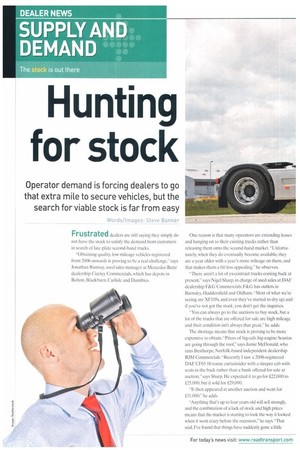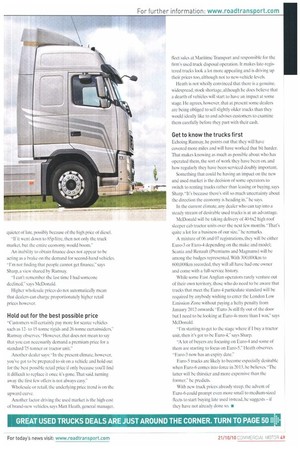Hunting for stock
Page 48

Page 49

If you've noticed an error in this article please click here to report it so we can fix it.
Operator demand is forcing dealers to go that extra mile to secure vehicles, but the search for viable stock is far from easy
Words/irnages: Steve banner
Frustrated dealers are still saying they simply do not have the stock to satisfy the demand from customers in search of late-plate second-hand trucks.
"Obtaining quality, low-mileage vehicles registered from 2006 onwards is proving to be a real challenge." says Jonathan Ramsay, used sales manager at Mercedes-Benz dealership Ciceley Commercials, which has depots in Bolton, Blackburn. Carlisle and Dumfries.
One reason is that many operators are extending leases and hanging on to their existing trucks rather than releasing them onto the second-hand market. "Unfortunately, when they do eventually become available, they are a year older with a year's more mileage on them, and that makes them a bit less appealing,he observes.
"There aren't a lot of ex-contract trucks coming back at present," says Nigel Sharp. in charge of used sales at DAF dealership F&G Commercials: F& .G has outlets in Barnsley. Huddersfield and Oldham. "Most of what we're seeing are XF105s, and even they've started to dry up; and if you've not got the stock, you don't get the inquiries.
"You can always go to the auctions to buy stock, but a lot of the trucks that are offered for sale are high mileage and their condition isn't always that great," he adds.
The shortage means that stock is proving to be more expensive to obtain. -Prices of big-cab. big-engine Scanias are going through the roof." says Jamie McDonald, who runs Besthorpe. Norfolk-based independent dealership RIM Commercials. "Recently I saw a 2008-registered DAF CF65 18-tonne curtainsider with a sleeper cab with seats in the back rather than a bunk offered for sale at auction," says Sharp. He expected it to go for £22,000 to £25,000, but it sold for £29,000.
It then appeared at another auction and went for L31,000," he adds.
"Anything that's up to four years old will sell strongly, and the combination of a lack of stock and high prices means that the market is starting to look the way it looked when it went crazy before the recession," he says."That said, I've found that things have suddenly gone a little quieter of late, possibly because of the high price of diesel.
"If it went down to 85p/litre, then not only the truck market, but the entire economy. would boom."
An inability to obtain finance does not appear to be acting as a brake on the demand for second-hand vehicles, "I'm not finding that people cannot get finance," says Sharp, a view shared by Ramsay.
"I can't remember the last time I had someone declined," says McDonald.
Higher wholesale prices do not automatically mean that dealers can charge proportionately higher retail prices however.
Hold out for the best possible price
"Customers will certainly pay more for scarce vehicles such as 12to 15-tonne rigids and 26-tonne curtainsiders," Ramsay observes. "However, that does not mean to say that you can necessarily demand a premium price for a standard 7.5-tonner or tractor unit."
Another dealer says: "In the present climate, however, you've got to be prepared to sit on a vehicle and hold out for the best possible retail price if only because you'll find it difficult to replace it once it's gone. That said. turning away the first few offers is not always easy."
Wholesale or retail, the underlying price trend is on the upward curve.
Another factor driving the used market is the high cost of brand-new vehicles, says Matt Heath, general manager, fleet sales at Maritime Transport and responsible for the firm's used truck disposal operation. It makes late-registered trucks look a lot more appealing and is driving up their prices too, although not to new-vehicle levels.
Heath is not wholly convinced that there is a genuine. widespread, stock shortage, although he does believe that a dearth of vehicles will start to have an impact at some stage. He agrees, however, that at present some dealers are being obliged to sell slightly older trucks than they would ideally like to and advises customers to examine them carefully before they part with their cash.
Get to know the trucks first Echoing Ramsay, he points out that they, will have covered more miles and will have worked that bit harder. That makes knowing as much as possible about who has operated them, the sort of work they have been on, and how regularly they have been serviced doubly important.
Something that could be having an impact on the new and used market is the decision of some operators to switch to renting trucks rather than leasing or buying, says Sharp. "It's because there's still so much uncertainty about the direction the economy is heading in," he says.
In the current climate, any dealer who can tap into a steady stream of desirable used trucks is at an advantage.
McDonald will be taking delivery of 40 6x2 high roof sleeper cab tractor units over the next few months, "That's quite a lot for a business of our size." he remarks.
A mixture of 06 and 07 registrations, they will be either Euro-3 or Euro-4 depending on the make and model; Scania and Renault (Premiums and Magnums) will be among the badges represented. With 300,000km to 600,000km recorded, they will all have had one owner and come with a full-service history.
While some East Anglian operators rarely venture out of their own territory, those who do need to be aware that trucks that meet the Euro-4 particulate standard will be required by anybody wishing to enter the London Low Emission Zone without paying a hefty penalty from January 2012 onwards. "Euro-3s still fly out of the door but I need to be looking at Euro-4s more than I was," says McDonald.
"I'm starting to get to the stage where if I buy a tractor unit, then it's got to be Euro-4," says Sharp.
"A lot of buyers are focusing on Euro-4 and some of them are starting to focus on Euro-5," Heath observes. "Euro-3 now has an expiry date."
Euro-5 trucks are likely to become especially desirable when Euro-6 comes into force in 2013, he believes. "The latter will be thirstier and more expensive than the former," he predicts.
With new truck prices already steep, the advent of Euro-6 could prompt even more small to medium-sized fleets to start buying late used instead, he suggests— if they have not already done so. •




























































































































